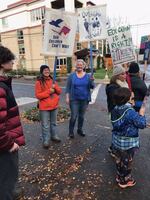Editor’s note: Election Day is Tuesday, Nov. 5. Stay informed with OPB on the presidential race, key congressional battles and other local contests and ballot measures in Oregon and Southwest Washington at opb.org/elections.
Portland is facing a historic election involving a new voting system and an unusually high number of candidates. Journalists at The Oregonian/OregonLive and Oregon Public Broadcasting share a goal of ensuring that Portland voters have the information they need to make informed choices, and we also know candidates’ time is valuable and limited.
That’s why the two news organizations teamed up this cycle to solicit Portland City Council candidates’ perspectives on the big issues in this election. Here’s what they had to say.

Sarah Silkie, candidate for Portland City Council District 4, in an undated photo provided by the candidate.
Courtesy of the candidate
Name: Sarah Silkie
Neighborhood: Maplewood
Renter/homeowner: Homeowner
Education: PhD in Civil & Environmental Engineer
Occupation: Civil engineer
How long you’ve lived in the city of Portland: 35 years
Age: 50
Pronouns: She/they
For each of the following questions, we asked candidates to limit their answers to 150 words.
Name two existing city policies or budget items you’d make it a priority to change. Why did you select those and how do you plan to line up at least 7 votes on the council to make them happen? Please avoid broad, sweeping statements and instead provide details.
1) Residential and Commercial Permitting: The problem is that the administrative rules themselves conflict and are overly complex. There is no clarification of who has decision-making authority when bureau chiefs disagree. Many rules are outdated and written for ideal situations. Accommodating real world conditions is done through a “Design Exception” process, which is time-consuming, expensive, and subjective. We need to clarify the rules so that Design Exceptions are the exception rather than the rule. I will be able to line up 7 votes on the new council because there is agreement that our permitting system is broken and I have actual experience working in it.
2) The Charter Commission referred an Office of Transparency Advocate, but the current Council shelved it. I will champion bringing that back. Judging by the front-runners in other districts, at least seven will see the good governance value in it.
What previous accomplishments show that you are the best pick in your district? Please be specific.
I am grateful for the teachers of Portland Public Schools, Portland Community College, and Reed. With their support I was able to get a great education in Portland, despite growing up in poverty and an unstable household. I went on to earn a PhD, adding new understanding to the body of knowledge for watershed protection. I then got my engineering license from the State of Oregon in a male-dominated field while raising three kids. These accomplishments required tremendous hard work, collaboration and evidence-based practices. I want to use those skills and persistence to serve our community.
Related: What you need to know about voting in Oregon and Southwest Washington
Portland is on track to permit the fewest number of multifamily units in 15 years and remains thousands of units below what’s needed to meet demand. What steps would you take to dramatically and quickly increase the availability of housing?
Two things: First, streamline the codes to overhaul permitting. I work in permitting on some complex projects. The dysfunction was never about who reports to which manager. The root cause of delays is confusing codes that not even the experts know how to reconcile or prioritize. Fixing that won’t immediately increase available bedrooms, but it will signal to investors that we are serious and when the financial climate improves, Portland is once again a safe and solid bet. Second, we should recognize that there’s already a lot of empty bedrooms in Portland. Some of them are AirBnBs, but many of them are not. I will champion incentives for house sharing, such as rebates or grants to make houses suitable for sharing and increased match-making. We should look at the return on investment: how many housing units are created and how fast for every public dollar spent on housing.
The next City Council is going to have to make some very difficult decisions regarding what to fund and how. What essential services must the city provide and how should the city sustainably fund them?
It’s important we both listen to District 4 residents and lead for a prosperous Portland in the long term. These are usually in lock-step, but countless times while campaigning I have heard new perspectives that have made me rethink the right approach for the city. I want that learning to continue. What I have heard is that basic services are essential: sidewalks, roads, bike paths, safe parks and safe streets. These are what front-line workers deliver and those are the functions I consider essential. There are two parts to sustainable funding: the revenue and the spending. Both need work. On the revenue side, we need to find a permanent, adequate funding source for transportation. Gas taxes by definition are not financially nor environmentally sustainable. I will urge the state to pass vehicle-mile-traveled fees to fund transportation.
Related: Issues important to Oregon voters
Portlanders have approved many tax measures in the past decade – supporting affordable housing, free preschool programs and green energy initiatives. Are there specific taxes or levies you want eliminated or would choose to not renew? Are there specific taxes or levies you would support creating? Why?
Many of the taxes, rates, and fees we pay in Portland do not go to the city but all impact Portland residents (e.g., Preschool for All is Multnomah County, Supportive Housing Services is Metro). A real issue is the lack of a holistic approach between all of the local governments. Additionally some of the larger ones like urban renewal, fly under the radar. I am not ready to undo anything voters have passed but I do know we need to solve transportation funding. It might need to be coordinated with the state: a simple vehicle-miles-travelled fee should be examined. Coupling transportation funding to fossil fuel consumption is a long-outdated model.
Do you have any concerns with the changes coming to city elections and city governance? If so, what would you like to see change?
As a city employee, and potential future councilor, I am really looking forward to the change. Every city employee I know voted for it. Having a professional city administrator instead of politicians managing the daily operations of the city will be a huge improvement. The stovepipes were at the top – not the average worker just trying to do their job as best as possible. One thing I will guard against on council is individuals who think they know better than the voters. Charter reform did not include a mayoral veto for a reason. I will champion collaboration, deliberation, and listening to all Portlanders as the precedent for how the new government functions.
Related: Listen to 'OPB Politics Now'

Sarah Silkie, candidate for Portland City Council District 4, in an undated photo provided by the candidate.
Courtesy of the candidate
For the five remaining questions, we asked candidates to answer in 50 words or fewer:
Do you favor arresting and jailing people who camp on public property in Portland who refuse repeated offers of shelter, such as the option to sleep in a city-designated tiny home cluster?
No. I do not believe that will be necessary once enough appropriate shelter and housing opportunities are available. And it is silly to argue about it until we do have enough shelter. We can cross that bridge once we get there.
Would you vote yes on a proposal to fund hundreds more police officers than the City Council has already authorized? Why or why not? How would the city pay for it?
No. I will vote yes to fund a 24/7 Portland Street Response presence city-wide. This will free-up other first responders. I would support re-allocation to traffic enforcement – there are too many traffic fatalities and countless more jarring near misses.
Do you support putting the Clean Energy Fund measure back on the ballot? What, if any changes, would you support?
No, but I would want to examine the evidence of past grants and pass policy to assure every PCEF dollar is being expended strategically.
Which would you prioritize: Creation of more protected bike lanes and priority bus lanes or improved surfacing of existing degraded driving lanes?
I will prioritize all modes of transportation over other expenditures. Roads for buses and small business deliveries, separated bike lanes, sidewalks, and curb-ramps. These are an interconnected system.
Have the problems impacting downtown Portland received too much or too little attention from current city leaders? Why?
I worked downtown through the pandemic (still do), and witnessed it empty, get downright scary, and start to reactivate. It has the infrastructure. It has been too little, but it’s not too late – we can reimagine downtown. To invest more anywhere in the city, we need a thriving downtown.